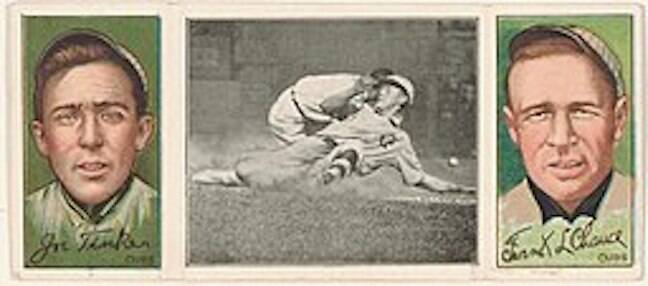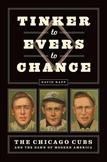Review: Three Cubs blaze a trail
The 1908 season marked the end of one era and the beginning of another for the Chicago Cubs. That season was the pinnacle of a run of success for the storied franchise, but also the beginning of more than a century of futility (they would not win the World Series again until 2016). But behind that team—and the teams of 1906, 1907 and even 1910—was a trio of infielders immortalized in the popular imagination by an eight-line poem describing their ruthless double-play efficiency.
The poem “Baseball’s Sad Lexicon,” by Franklin Pierce Adams, begins with the lines “These are the saddest of possible words: Tinker to Evers to Chance.” Joe Tinker, Johnny Evers and Frank Chance played shortstop, second base and first base respectively for the Cubs and formed the core of a team that won four pennants and two World Series titles in five years. Their defensive combination was devastating to opposing teams; and combined with the rest of the team’s clutch hitting and ace pitching, they made the Cubs a force to be reckoned with in the first decade of the century.
In part, Rapp contends, baseball was a reaction against the upright (and uptight) ways of the Victorians and their strict Calvinist roots.
Rapp uses the three players to examine what baseball was like at the turn of the 20th century, what the sport had evolved from and where it was going. Organized baseball, he says, was first played prior to the Civil War, but the game we know today evolved as a “quasi-professional activity in urban social clubs and recreational leagues.” In part, Rapp contends, baseball was a reaction against the upright (and uptight) ways of the Victorians and their strict Calvinist roots. Baseball was more than a sport: It was a social phenomenon that grew in a way nothing else had done before it.
Rapp delves into brief biographies of Tinker, Evers and Chance to show that baseball was truly a national sport before it became the national pastime. The Cubs were one of the sport’s earliest dynasties, and the fact they were from Chicago, which Rapp contends was the epicenter of the baseball world, meant that the game was here to stay. The infield trio dissolved in 1912, which is where Rapp quite abruptly ends the book. But ultimately their run of success became a blueprint for and a harbinger of the success of the sport.
This article also appeared in print, under the headline “Six Four Three,” in the September 3, 2018, issue.









